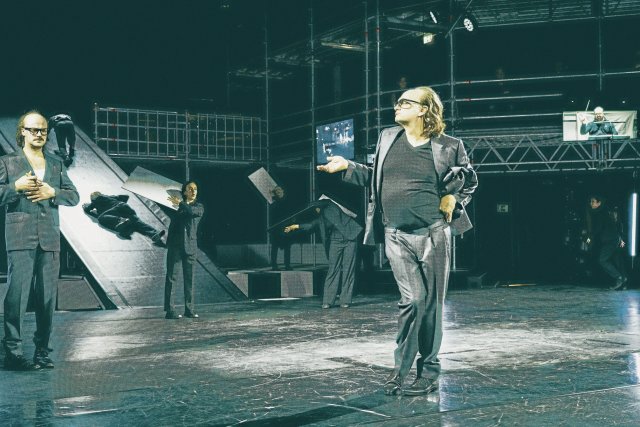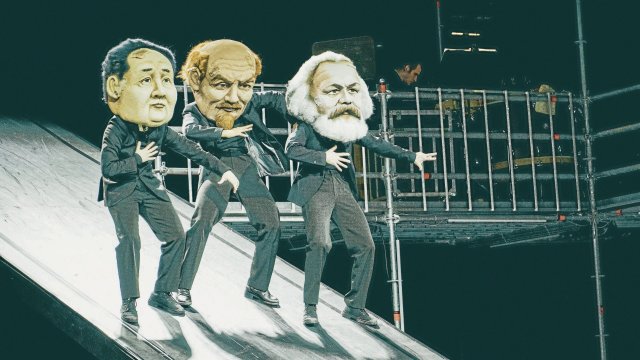Mao, Lenin and Marx from Team Communism are also allowed to appear at the Kassel State Theater…
Photo: Sylwester Pawliczek (MACHMA MACHMA)
His drama is no longer happening. This is how Heiner Müller expressed it in his 1977 play “The Hamlet Machine,” with which the great GDR playwright became a world writer. Growing out of his involvement with Shakespeare, the short text became a style-former for so-called post-dramatic theater. Anticipating the humorous talk of the end of history, it is a scenic reflection on the downfall of socialism, on the total present under capitalism and the wait for the coming uprising.
Almost a decade later, the composer Wolfgang Rihm, then just 35 years old, developed a “musical theater in 5 parts” from Müller’s eloquent text. The libretto provided by Rihm further compresses the already extremely condensed original; His large-scale composition takes up the resistance of Müller’s world of thought and transfers it into music.
Premiered in 1987 under the direction of Peter Schneider at the National Theater Mannheim, the opera was re-enacted at the Städtische Bühnen Freiburg, the Hamburg State Opera and the Prinzregententheater Munich. It was last heard at the Zurich Opera House in 2016. The opus celebrated its premiere last Saturday at the Staatstheater Kassel.
Where drama no longer takes place, life looks for other forms of expression. The provincial farce, for example. This is also the case in Kassel, where – despite the Documenta – small-minded people have always tried to prevent the creation of art. The list of theater directors whose last energy was robbed is very long. Worse things could not always be prevented, especially when the local press took up the cause of campaign-like cultural policy itself.

… and author Heiner Müller, doubled several times, is also there.
Photo: Sylwester Pawliczek (MACHMA MACHMA)
It can be seen as a positive sign that Florian Lutz’s contract was extended during the rehearsal period for “The Hamlet Machine”, meaning he will be the artistic director of the house until 2031. As a director and part of a three-person management team, Lutz had already awakened the Halle Opera from its slumber before taking over the multi-discipline theater in Kassel in 2019. Since then, the stage has attracted national attention several times, regardless of all the reactionary attacks from the city.
With his elaborate opera schedule, Lutz promotes contemporary compositions on the one hand and critically questions the canon on the other. Occasional failure is also essential. It’s good if someone has the courage to do it. What doesn’t sound very subversive is definitely worth mentioning in the sedate music theater business. Conservative elitism still rules the opera world. The fact that “The Hamlet Machine” is now being performed in Kassel, once again demonstrating the repertoire capability of this modern classic, fits well into the picture of the new beginnings at the State Theater.
From the stage, a walkable walkway runs through the entire stalls. The hall and stage offer numerous projection surfaces for video transmissions (Robert Lässig). The orchestra (musical director: Francesco Angelico) has disappeared into the ditch. And now the checkerboard-patterned spatial stage (Sarah-Katharina Karl) challenges the ensemble of singers, dancers and actresses to play, which Florentine Klepper and Valentin Alfery staged as a director-choreographer duo.
nd.DieWoche – our weekly newsletter
With our weekly newsletter nd.DieWoche look at the most important topics of the week and read them Highlights our Saturday edition on Friday. Get your free subscription here.
Just as Heiner Müller breaks with the narrative structure of a classical drama and turns his piece into a dance of associations, Wolfgang Rihm also uses all sorts of quotations in his harsh music, which he artfully puts together without making any breaks unrecognizable. He does not harmonize the horrors of the story compositionally, but rather unleashes them on the audience as an acoustic challenge. His musical theater does not do any violence to the original, because it does not unify, but rather maintains its enigmatic nature and creates new riddles.
Theatrical text and composition are a rebellion against a society that has forgotten history. Hamlet’s struggles in the face of the intrusion of reality, Ophelia’s resistance to the role intended for her – none of this is just the past, nothing is just the present. Both become understandable only when we become aware of the historicity of modern existence.
How sadly timeless does a sentence like “My disgust is a privilege, protected by a wall, barbed wire, prison” remain? The players, dancers and singers all stand on the coast, with the ruins of Europe behind them. Still, again and again.
Drama is happening again, one would think, most likely in music. In Kassel, for example. In view of such efforts, the evening’s staging weaknesses remain forgivable, for example when the images and choreographies found are too illustrative and sometimes trivializing. Or when the rather banal idea of bringing Heiner Müller onto the stage as a character himself is far overused in time and space. Nevertheless – the production is an enjoyable challenge. We hope you have an audience that wants to be challenged.
Next performances: March 13th, 16th and 22nd
www.staatstheater-kassel.de
Become a member of the nd.Genossenschaft!
Since January 1, 2022, the »nd« will be published as an independent left-wing newspaper owned by the staff and readers. Be there and support media diversity and visible left-wing positions as a cooperative member. Fill out the membership form now.
More information on www.dasnd.de/genossenschaft
